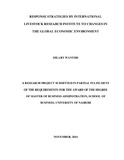| dc.contributor.author | Wanyiri, Hilary | |
| dc.date.accessioned | 2014-11-13T11:23:22Z | |
| dc.date.available | 2014-11-13T11:23:22Z | |
| dc.date.issued | 2014 | |
| dc.identifier.citation | Master Of Business Administration Degree, School Of Business, University Of Nairobi, 2014 | en_US |
| dc.identifier.uri | http://hdl.handle.net/11295/74786 | |
| dc.description.abstract | The environment in which organizations operate is dynamic and changes from time to time. Many factors in the external environment cause turbulence and uncertainty for organizations. The environment therefore imposes major constraints on the choices managers make for the organization. Organizations must find ways of surviving in times of rapid, transformative changes in the economic environment. Organizations are linked to the environment by strategy. They have to adopt strategies that match the environment in order to be successful. Public funding for agricultural research has declined with increased negative perceptions about its value. The International Livestock Research Institute (ILRI) works to improve food security and reduce poverty in developing countries through research for better and more sustainable use of livestock. These changes have affected how ILRI has fulfilled its global mandate to extend its programmes beyond Africa and to strengthen its partnerships. The purpose of this study was to establish the strategies used by ILRI to respond to the changes in the global economic environment. The study also aimed to find out challenges faced by ILRI in response to the changes in the global economic environment. The study used primary and secondary data. Interviews were used to collect information from sampled participants in the top level management. Descriptive analysis and content analysis were used to analyze data. The study found that a significant number of respondents (84%) agreed that changes in the global economic climate have affected ILRI. The study found that the funding for livestock research at ILRI had taken a hit from the 2007-2008 economic crisis. According to the respondents, to function effectively ILRI need not only trained personnel but also adequate funds to cover fixed and operating costs. The study also found that a significant number (95%) agreed that human resource development was one of the response strategies adopted by ILRI. A significant number (93%) also agreed that the organization carried out restructuring in response to the global economic changes. The study found that ILRI also adopted other response strategies. This involved the adoption of a strategic plan, partnership strategy and risk policy. A significant number (92%) of participants indicated that the response strategies were very effective in enabling ILRI respond to changes in the economic climate. The study found that employee resistance to change was one of the stumbling blocks in adopting response strategies. Other challenges included lack of funds to finance various activities and bureaucracy in the organization. The researcher concluded that the organization had embraced reliable response strategies in its change process. The researcher concludes that ILRI employees were involved in the formulation of response strategies ensuring that the organization came up with acceptable strategies. The researcher also concludes employee resistance and lack of adequate funds were the challenges facing the response strategies. The researcher recommends that all organizations should have well planned strategies on how to respond to changes in the global environment. Such plans should be developed way before any changes happen. The researcher also recommends that employees should be involved in every step of the change process to reduce any resistance. In addition, the researcher recommends that response strategies should take into consideration the financial implications since in times of crisis monies may be lost negatively affecting the financial position of the organization. | en_US |
| dc.language.iso | en | en_US |
| dc.publisher | University of Nairobi | en_US |
| dc.title | Response Strategies by International Livestock Research Institute to Changes in the Global Economic Environment | en_US |
| dc.type | Thesis | en_US |
| dc.type.material | en_US | en_US |

